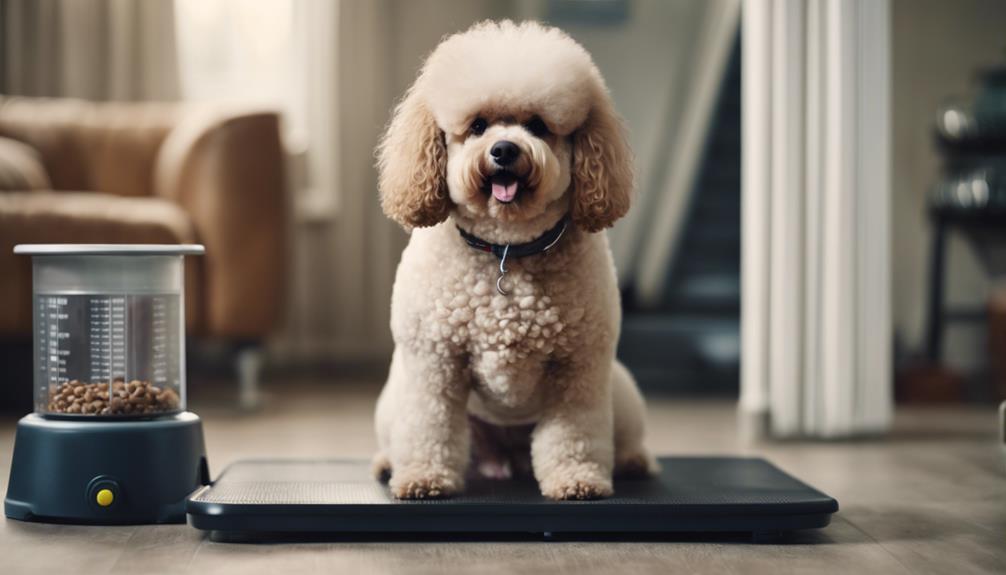When it comes to your furry companion's health, maintaining an optimal weight is crucial for their well-being. However, poodle obesity is a concern that requires careful attention. Are you aware of the subtle signs that may indicate your poodle is overweight? Understanding the risks associated with excess weight and how to address them is vital to ensuring your poodle's longevity and happiness.
Key Takeaways
- Regular monitoring and tailored diet plans are essential for preventing obesity in Poodles.
- Daily aerobic exercise and portion control help manage weight effectively.
- Opt for high-quality, nutrient-rich food and address behavioral factors to support weight management.
- Consult with a vet for personalized weight management strategies to ensure a healthy lifestyle for Poodles.
Poodle Obesity: Understanding the Issue

Poodles, known for their love of food and lack of self-control, are particularly prone to obesity, a serious health concern that can lead to various complications. As a dog owner, it is crucial to understand the risks associated with your Poodle being overweight. Even a small weight gain in these small dogs can have significant health implications, including diabetes, joint problems, and a reduced lifespan.
To help your Poodle maintain a healthy weight, it is essential to monitor their food intake carefully. Avoid overfeeding and opt for high-quality, balanced dog food to meet their nutritional needs without excess calories. Additionally, ensure proper portion control and limit treats to prevent unnecessary weight gain. Regular exercise is also vital for managing your Poodle's weight effectively.
If you notice your Poodle becoming overweight, seek help from a veterinarian. They can provide guidance on creating a tailored weight management plan that includes diet adjustments, exercise routines, and monitoring strategies to support your Dog in achieving a healthy weight.
Importance of Healthy Weight for Poodles
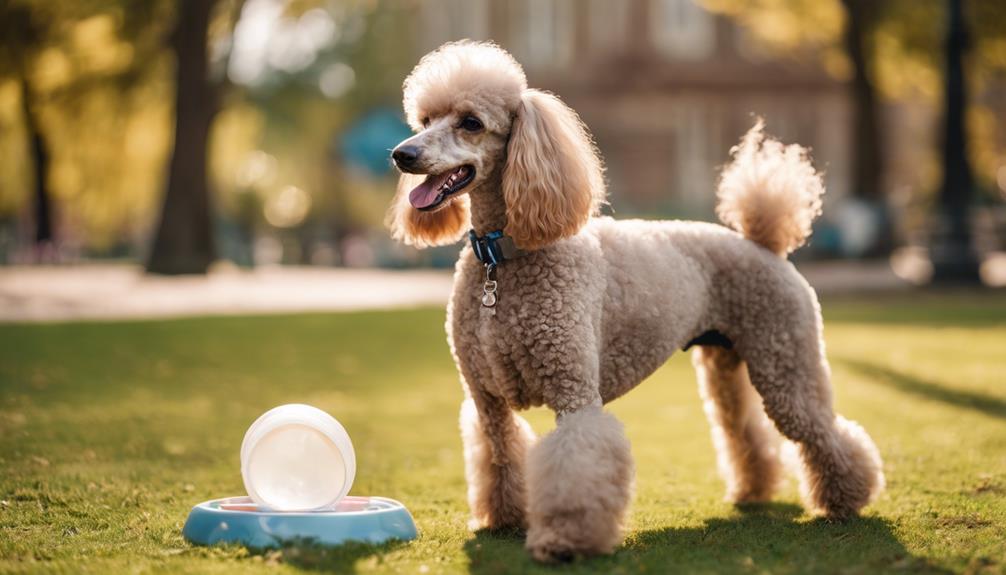
To ensure the optimal health and longevity of your Poodle, maintaining a healthy weight is paramount in preventing a range of obesity-related complications. Poodles, due to their affinity for food and potential lack of exercise, are particularly prone to obesity. Obesity in Poodles can result in various health issues such as joint problems, diabetes, and a decreased lifespan. Effective weight management through monitoring their food intake and ensuring regular exercise is essential for their overall well-being and quality of life. By controlling the number of calories they consume and engaging them in appropriate physical activity, you can help your Poodle maintain a healthy weight and avoid the detrimental effects of obesity. Making conscious choices about their diet and exercise routine not only prevents obesity but also enhances their quality of life, ensuring they lead a happy and healthy existence.
Identifying Signs of Obesity in Poodles
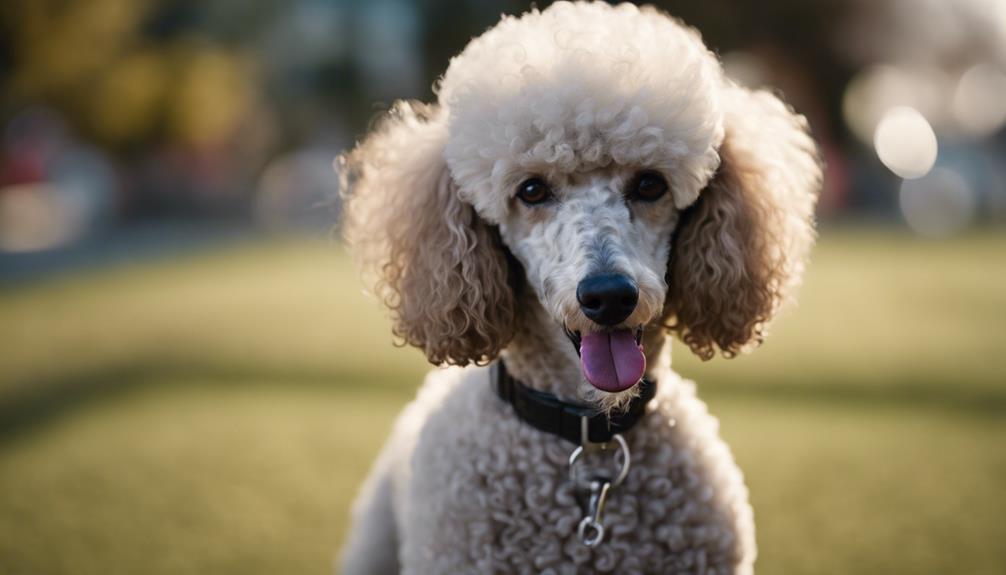
Recognizing signs of obesity in Poodles can be crucial for early intervention and effective weight management. The table below outlines common signs of obesity in Poodles, aiding in prompt identification and necessary action.
| Signs of Obesity in Poodles | Description |
|---|---|
| Inability to feel ribs | Excessive fat makes it hard to feel the ribs easily. |
| Lack of defined waist | The waist area appears straight, lacking a noticeable tuck. |
| Excessive lethargy | Unwillingness to engage in physical activities and play. |
To prevent and manage obesity in Poodles, it is essential to focus on weight management through proper diet, portion control, and regular exercise. Monitoring their body condition score regularly can help in assessing their weight status accurately. By staying vigilant and addressing signs of obesity promptly, you can ensure your Poodle leads a healthy and active life.
Risks Associated With Poodle Obesity
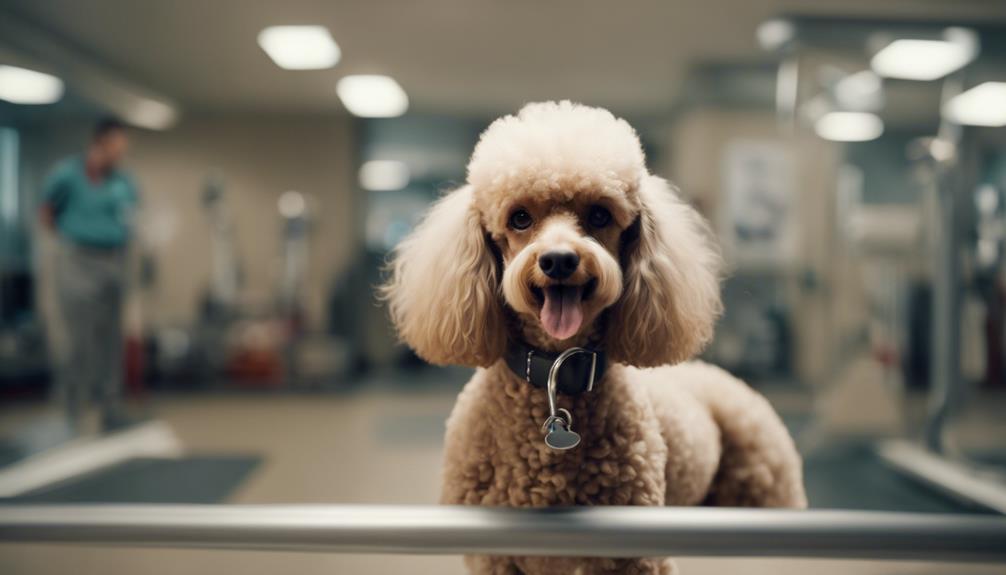
When a Poodle becomes obese, the excess weight puts strain on their joints, increasing the risk of conditions like osteoarthritis. Furthermore, obesity in Poodles can lead to insulin resistance, predisposing them to diabetes. Studies suggest that overweight Poodles have a higher likelihood of developing cardiovascular issues, impacting their lifespan significantly.
Health Implications of Obesity
Obesity in Poodles poses significant health risks, including the development of diabetes, joint issues, and cardiovascular disease. Excess weight can worsen conditions such as hip dysplasia and arthritis in Poodles. Additionally, obese Poodles are at a higher risk of respiratory problems, heat intolerance, and a shortened lifespan. Obesity can lead to reduced mobility, lethargy, and an overall decrease in the quality of life for Poodles. Preventing and managing obesity in Poodles is essential for their well-being. By maintaining a healthy weight through proper diet and regular exercise, you can help reduce the likelihood of these health issues and ensure a happier, healthier life for your beloved Poodle.
Impact on Lifespan
Excess weight in Poodles significantly impacts their lifespan, with obese individuals facing a higher risk of developing various health complications such as diabetes, joint issues, and heart disease. Obesity in Poodles not only shortens their lifespan but also decreases their quality of life by reducing mobility and increasing the likelihood of respiratory difficulties. Studies have shown that overweight Poodles are more prone to joint problems, which can further impact their ability to move comfortably. Additionally, the risk of heart disease rises with obesity in Poodles, emphasizing the importance of maintaining a healthy weight to promote longevity. By managing weight effectively, Poodle owners can help prevent these serious health issues and ensure their pets lead longer, healthier lives.
Poodle Obesity: Diet Considerations
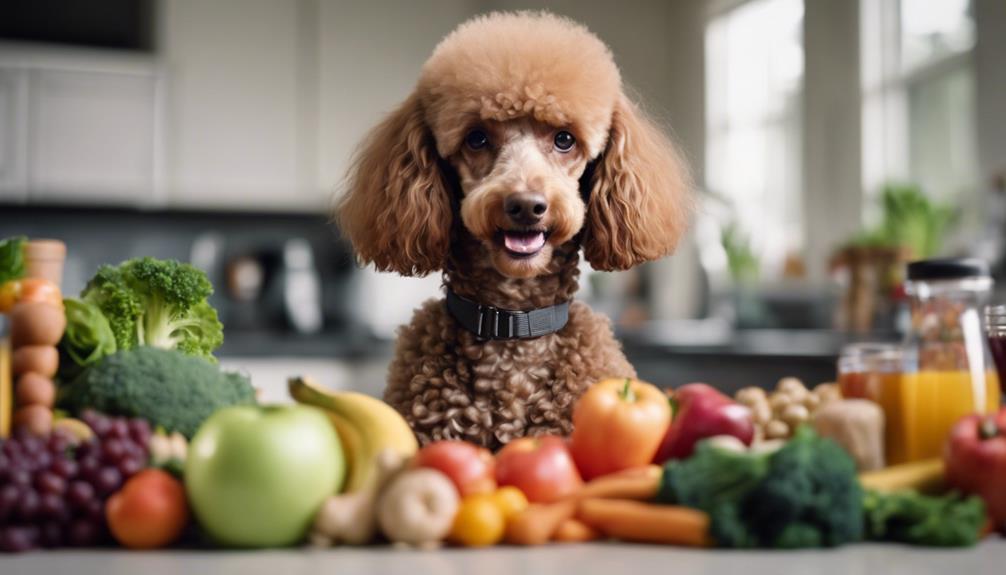
When addressing Poodle obesity through diet considerations, focus on nutrient-rich food choices to meet their specific dietary needs. Portion control plays a vital role in regulating calorie intake and weight management. Establishing a regular exercise routine will complement dietary adjustments in maintaining your Poodle's health.
Nutrient-Rich Food Choices
Ensuring your poodle's diet consists of nutrient-rich, high-quality dog food is essential for maintaining a healthy weight and preventing obesity. When selecting food for your poodle, opt for formulas with balanced nutrients, including appropriate protein and fiber levels to support weight management. Avoid foods with high-calorie, low-nutrient fillers that can contribute to obesity. Consulting a veterinarian for specific diet recommendations tailored to your poodle's needs is advisable to prevent and manage obesity effectively. Consider the table below for nutrient-rich food choices:
| Nutrient-Rich Food Choices | Protein Content | Fiber Content |
|---|---|---|
| Weight Management Formula | High | Moderate |
| High-Quality Dog Food | Adequate | Varied |
| Balanced Nutrient Diet | Optimal | Essential |
Portion Control Importance
To effectively manage poodle obesity and promote a healthy weight, understanding the importance of portion control is paramount. When it comes to weight management and preventing obesity-related health issues in poodles, accurate portion control plays a significant role. Here are five key points to consider:
- Portion control: Regulating food intake helps prevent excess calories.
- Weight management: Proper portion sizes support weight loss and maintenance.
- Balanced nutrition: Portion control ensures poodles receive essential nutrients.
- Obesity-related health issues: Accurate portion sizes can help prevent health problems.
- Accurate portion sizes: Measuring food accurately aids in managing weight effectively.
Regular Exercise Routine
Developing a consistent exercise routine is crucial for managing poodle obesity and incorporating balanced diet considerations to ensure optimal health. Poodles require regular physical activity to prevent obesity and maintain a healthy weight. Daily walks and structured activities such as agility training, fetch, and interactive play sessions are essential for burning calories and keeping Poodles fit. Exercise plays a vital role in helping Poodles stay active, improve muscle tone, and prevent weight-related health issues. Consistent physical activity is key to weight management and promoting overall well-being in Poodles. By engaging in regular exercise, you can help your Poodle maintain a healthy weight, increase muscle tone, and prevent obesity-related complications, ensuring a happy and healthy companion.
Strategies for Poodle Weight Management
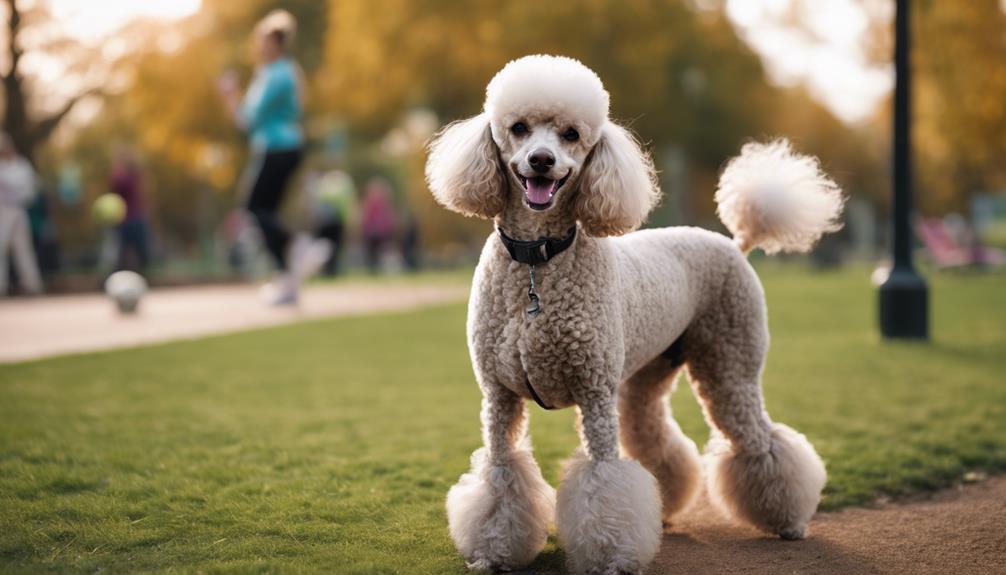
For effective management of a Poodle's weight, implementing a tailored diet and exercise plan is essential. When dealing with obesity in Poodles, specific strategies tailored to their needs can make a significant difference in their health and well-being. Here are some key approaches to consider:
- Tailored Diet: Create a diet plan that meets the nutritional needs of your Poodle while controlling calorie intake to prevent weight gain.
- Portion Control: Measure your Poodle's food portions to avoid overfeeding and monitor their calorie consumption closely.
- Calorie Monitoring: Keep track of the calories your Poodle consumes daily to ensure they are within the recommended range for weight management.
- Regular Vet Consultation: Regularly consult with your veterinarian to assess your Poodle's weight, adjust the diet and exercise plan as needed, and monitor their overall health.
- Consistency is Key: Stick to the weight management plan consistently to see positive results and maintain your Poodle's healthy weight.
Exercise Tips for Overweight Poodles
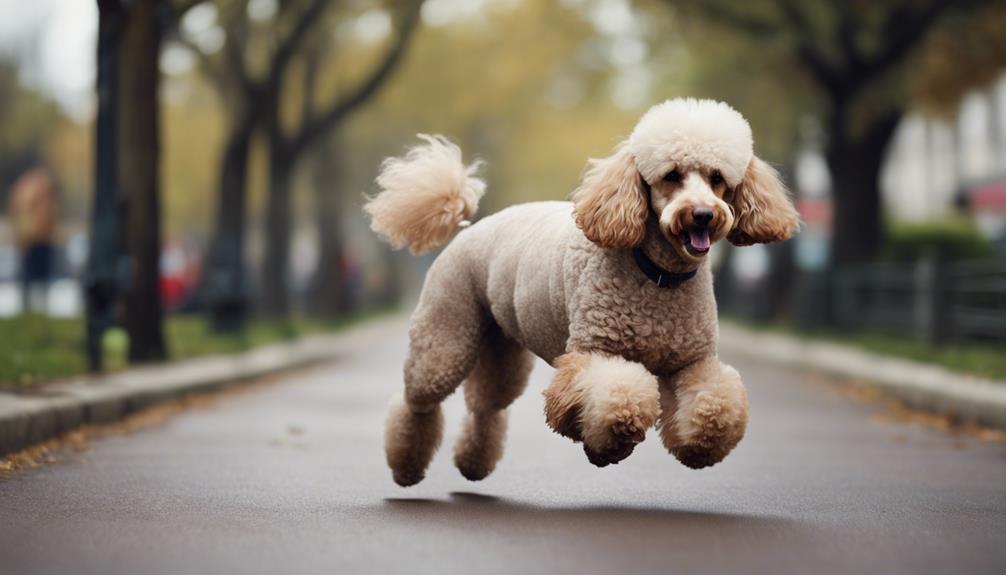
Implementing appropriate exercise routines is crucial for overweight Poodles to aid in weight loss and improve overall health. Overweight Poodles benefit greatly from at least 30 minutes of daily aerobic activity to support weight loss. Structured aerobic activities such as brisk walks or interactive play sessions are ideal for helping overweight Poodles shed excess pounds. These activities not only help in burning calories efficiently but also contribute to maintaining a healthy weight. Tailoring exercise routines to suit your Poodle's age, breed, and health status is essential for effective weight loss. Positive reinforcement and distraction techniques can be valuable tools in managing begging behavior during exercise sessions, ensuring a more productive workout for your furry friend. The table below provides some examples of suitable exercises for overweight Poodles:
| Type of Exercise | Description | Benefits |
|---|---|---|
| Brisk Walks | Structured walks at a moderate pace | Improves cardiovascular health |
| Interactive Play Sessions | Engaging play activities with your Poodle | Enhances mental stimulation |
| Swimming | Low-impact exercise in water | Builds muscle strength and endurance |
Creating a Weight Management Plan
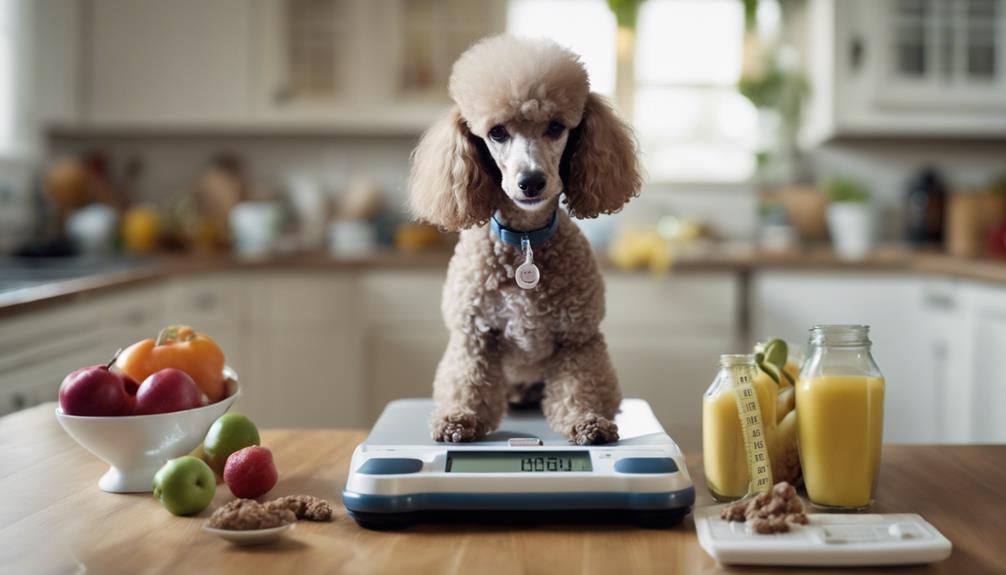
To establish an effective weight management plan for your Poodle, begin by determining its ideal weight range in consultation with a veterinarian and based on breed standards.
- Feeding: Choose a high-quality, low-calorie diet specifically tailored for weight loss in Poodles to meet their nutritional requirements.
- Weight: Monitor your Poodle's weight regularly to track progress and adjust the diet accordingly.
- Diet: Implement portion control strategies, such as measuring meals and avoiding free-feeding, to manage calorie intake effectively.
- Healthy Weight: Aim to achieve a healthy weight for your Poodle to prevent obesity-related health issues.
- Exercise: Incorporate regular exercise routines into your Poodle's daily schedule to promote weight loss and overall well-being.
Monitoring Progress and Adjusting

To effectively monitor and adjust your Poodle's weight management plan, it is crucial to regularly weigh your pet, make dietary changes as needed, and modify exercise routines accordingly. If your Poodle is not responding as expected to the weight loss program, adjustments may be necessary to ensure progress. Consulting with your veterinarian will help tailor the plan to your Poodle's specific needs and optimize the weight management process.
Regular Weigh-Ins
Regular weigh-ins play a crucial role in monitoring the progress of poodle weight loss and making necessary adjustments to the management plan.
- Tracking Effectiveness: Weigh-ins help monitor the effectiveness of the weight management program.
- Adjusting Plans: Adjustments based on weigh-in results keep poodles on the path to their ideal weight.
- Assessing Success: Weigh-in data is valuable for assessing the success of weight management strategies.
- Early Detection: Consistent weigh-ins aid in early detection of any weight fluctuations or challenges.
- Ensuring Progress: Regular weigh-ins are essential to ensuring effective weight loss and maintaining a healthy weight for poodles.
Dietary Changes as Needed
For effective weight management and monitoring progress in your poodle, it is crucial to adjust their diet as needed based on weight trends and vet recommendations. Keep a close eye on weight trends and regularly assess your poodle's body condition to track the effectiveness of weight loss efforts. Implement gradual dietary changes to prevent digestive issues and support a smooth transition to a new weight-loss plan. Consistency in monitoring food intake and practicing portion control are key components of successful weight management. Seek guidance from your veterinarian for personalized dietary adjustments tailored to your poodle's specific needs. By making necessary dietary changes based on weight trends and professional recommendations, you can ensure your poodle maintains a healthy weight and overall well-being.
Exercise Routine Modifications
When monitoring progress and adjusting your Poodle's exercise routine for weight management, track their daily activity levels and duration diligently. To effectively manage your Poodle's weight, consider the following:
- Monitor your Poodle's daily aerobic activity aiming for at least 30 minutes.
- Adjust the exercise routine based on your Poodle's response and weight loss goals.
- Regularly assess your Poodle's weight and body condition to evaluate progress.
- Modify the exercise plan as needed to ensure your Poodle remains active.
- Aim for consistency and gradual progress in achieving weight loss goals.
Treats and Poodles: Finding Balance
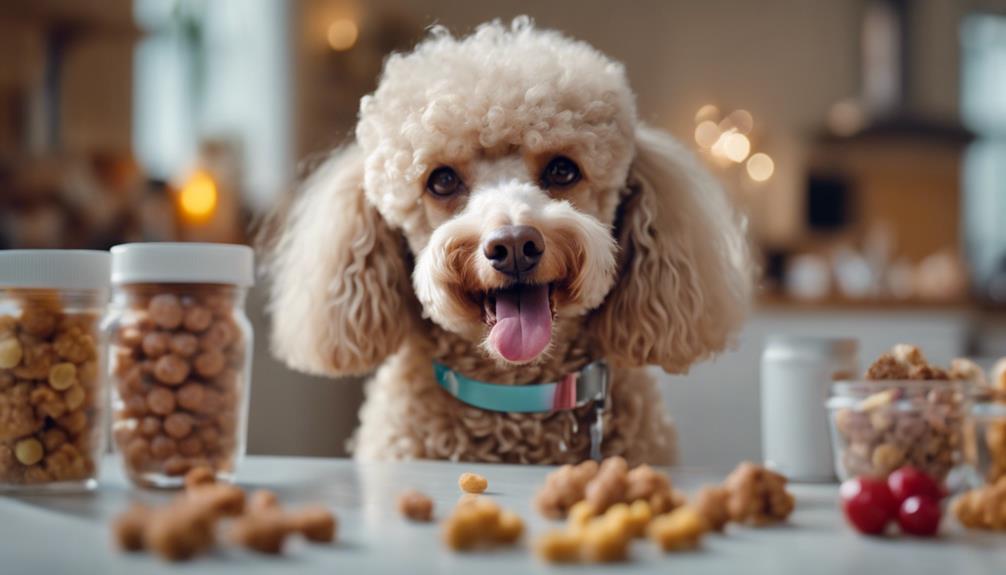
To maintain a healthy weight in Poodles, striking a balance with treats is essential due to their predisposition to obesity and love for food. Poodles are known to be food enthusiasts and may often beg for treats, making it crucial to monitor their treat intake. Limiting high-calorie treats and table scraps is key in preventing weight gain in these dogs. Opt for healthy treat options that are low in calories to reward your Poodle without adding excess weight. Portion control plays a significant role in managing treats; consider breaking treats into smaller pieces or using specialized treat-dispensing toys to control portions effectively.
Consistency in managing treats and snacks is vital for successful weight management in Poodles. By incorporating healthy options and being mindful of portion sizes, you can help your Poodle maintain a healthy weight while still enjoying treats. Remember, a balanced approach to treats is essential in keeping your Poodle happy and healthy.
Incorporating Vegetables Into Poodle's Diet
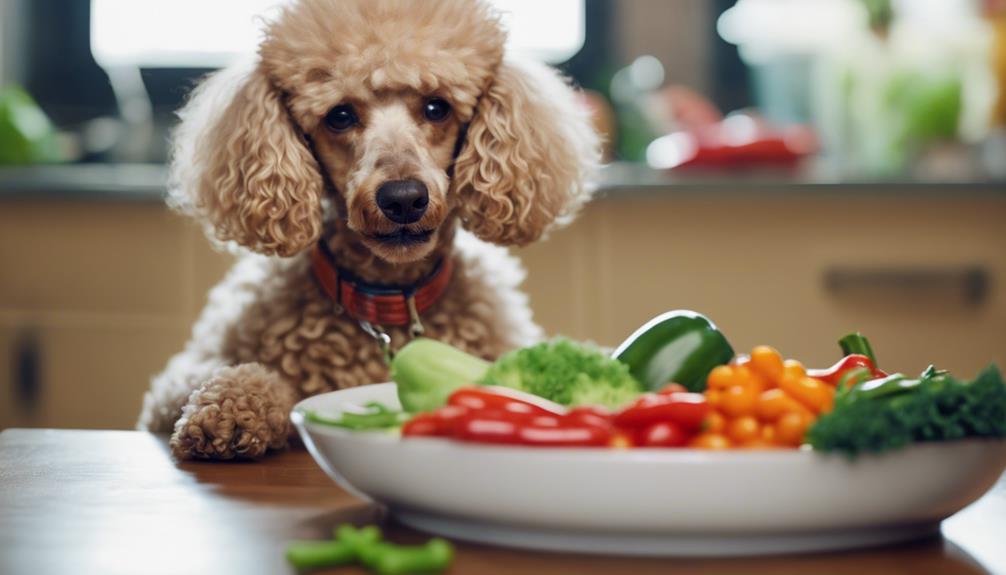
Incorporating a variety of vegetables like green beans and carrots into your Poodle's diet provides essential nutrients and fiber crucial for weight management. These veggies can help increase meal volume without adding excess calories, aiding in your Poodle's satiety during weight-loss efforts. Consider different cooking methods to prepare vegetables for your Poodle, ensuring they receive a colorful and nutritious meal.
Veggie Variety for Poodles
Enhancing a Poodle's diet with a diverse array of vegetables can significantly contribute to their nutritional well-being and weight management.
- Including vegetables like green beans, carrots, and sweet potatoes can provide essential nutrients and fiber for weight management in Poodles.
- Vegetables help increase satiety, reduce overall calorie intake, and support digestive health in Poodles.
- Adding variety through vegetables makes mealtime more enjoyable for Poodles and prevents food boredom.
- Vegetables are low in calories and high in vitamins, minerals, and antioxidants, making them a healthy addition to a Poodle's diet.
- Incorporating vegetables in a Poodle's diet can help control weight, improve overall health, and contribute to a balanced nutrition plan.
Portion Control Tips
Adding a variety of vegetables to your Poodle's meals can effectively aid in portion control while providing essential nutrients and fiber for weight management. Vegetables like green beans or carrots can help fill up your Poodle without adding extra calories, making them a healthy option for weight management. Additionally, vegetables offer vitamins, minerals, and antioxidants that support overall health while helping control portion sizes. Here is a simple table illustrating some vegetables you can incorporate into your Poodle's diet:
| Vegetable | Benefits |
|---|---|
| Green Beans | High in fiber |
| Carrots | Rich in vitamins |
| Broccoli | Contains antioxidants |
| Spinach | Low in calories |
| Bell Peppers | Provides essential nutrients |
Cooking Methods for Veggies
To optimize the nutritional benefits of vegetables for your Poodle, consider utilizing gentle cooking methods such as steaming or boiling.
- Cooking vegetables for your Poodle can enhance digestibility and nutrient absorption.
- Steaming or boiling veggies can soften them for easy consumption by your Poodle.
- Avoid seasoning vegetables with salt, garlic, or onions as they can be harmful to dogs.
- Incorporating vegetables like carrots, green beans, and sweet potatoes can add fiber and vitamins to your Poodle's diet.
- Cooked vegetables can be mixed with your Poodle's regular food to encourage balanced nutrition and weight management.
Hydration and Weight Management

A crucial aspect of poodle weight management involves ensuring adequate hydration levels to support metabolic functions and control appetite. Hydration plays a significant role in weight management for poodles, as it aids in appetite control and helps prevent overeating. Water-rich foods such as fruits and vegetables can contribute to hydration and assist in weight loss efforts for poodles. Proper hydration can also promote a feeling of fullness, reducing the likelihood of excessive calorie consumption. Dehydration, on the other hand, can lead to false hunger signals in poodles, potentially causing them to consume more calories than necessary. Monitoring water intake is essential to maintain optimal hydration levels and support overall weight management in poodles. By prioritizing hydration, you can help your poodle regulate their appetite, support their metabolism, and prevent overeating, all of which are crucial aspects of weight management for your furry companion.
Poodle Obesity: Professional Guidance
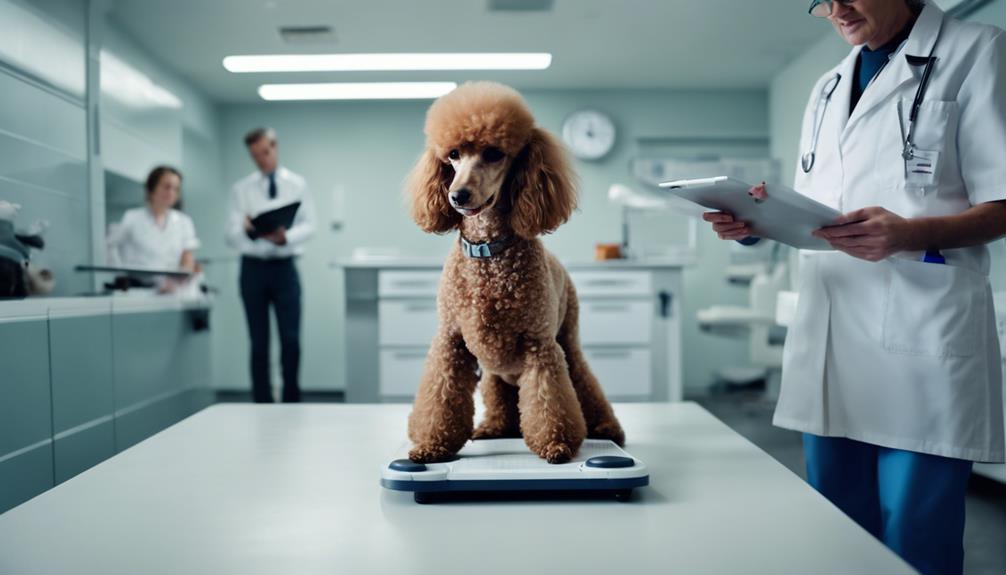
When seeking guidance for managing poodle obesity, consulting with a veterinarian is essential to develop a tailored plan addressing your Poodle's specific needs and health concerns. Professional guidance is crucial in ensuring effective weight management and addressing any underlying health issues that may contribute to your Poodle's weight. Here are some key points to consider:
- Consult with a veterinarian to determine the ideal weight range for your Poodle.
- Follow a tailored weight management plan designed by a professional for your Poodle's specific needs.
- Professional guidance can help address any underlying health issues contributing to your Poodle's weight.
- Veterinarians can recommend appropriate diet and exercise routines to prevent and manage obesity in Poodles.
- Regular check-ups with a veterinarian can track progress and make necessary adjustments to your Poodle's weight management program.
Behavioral Factors in Poodle Weight

Addressing behavioral factors like begging, scavenging, and lack of exercise is crucial in understanding and managing weight gain in Poodles. Poodles, like many dogs, may overeat due to behavioral triggers such as boredom, stress, or lack of mental stimulation. These factors can lead to weight gain if not addressed effectively. Training Poodles to resist begging, providing interactive toys for mental stimulation, and engaging them in regular exercise are essential in managing their weight and preventing obesity. By understanding and addressing these behavioral triggers, you can help your Poodle maintain a healthy weight. Creating a structured routine for feeding and exercise can also play a significant role in regulating your Poodle's behavior and preventing weight-related issues. Remember, prevention is key in managing weight, and by incorporating these strategies into your Poodle's daily routine, you can help them lead a healthier and happier life.
Long-Term Success in Poodle Weight Management

For successful long-term management of Poodle weight, consistent monitoring and adjustment of food portions and exercise routines are crucial. To ensure lasting success in weight management for your Poodle, consider the following key strategies:
- Safe Weight Loss: Opt for a gradual weight loss approach, aiming to reduce your Poodle's body weight by 3-5% per month to avoid health complications.
- Regular Weigh-Ins: Schedule frequent weigh-ins to track progress accurately and make necessary adjustments to the weight loss program.
- Body Condition Assessments: Conduct regular assessments to evaluate your Poodle's body condition and adjust the weight management plan accordingly.
- Structured Aerobic Activities: Incorporate aerobic exercises into your Poodle's routine to promote calorie burning and overall fitness.
- Veterinarian Guidance: Work closely with your veterinarian to establish realistic weight loss goals and receive tailored advice on the best strategies to manage your Poodle's weight effectively.
Frequently Asked Questions
What Is the Most Effective Way to Prevent Obesity in Dogs?
To prevent obesity in dogs, maintain a balanced diet and exercise routine. Utilize portion control, feed high-protein meals, schedule regular check-ups, engage with interactive toys, and offer healthy treats. These practices foster a healthy lifestyle.
Are Poodles Prone to Obesity?
You have to be vigilant with poodles. They have a penchant for overeating, making obesity a lurking risk. Monitor their weight, control portions, substitute treats wisely, and ensure ample exercise to prevent health hazards.
When Should I Put My Dog on Weight Management Food?
When should you put your dog on weight management food? It's essential to consider portion control, establish an exercise routine, explore treat alternatives, track food intake, seek vet consultation, and implement behavior modification techniques to help manage weight effectively.
How Long Will It Take a Dog to Lose 5 Lbs?
To lose 5 pounds, your dog may take around two to three months with proper weight management. Regularly monitor progress, adjust diet and exercise, and consult a vet for safe caloric needs. Dedication is key.
Conclusion
In conclusion, managing obesity in poodles is crucial for their health and well-being. Just as a well-tuned engine requires proper maintenance to run smoothly, so too does a poodle need a balanced diet and regular exercise to maintain a healthy weight. By following a tailored weight management plan and closely monitoring their progress, you can ensure your poodle leads a long and happy life. Remember, a healthy poodle is a happy poodle!
